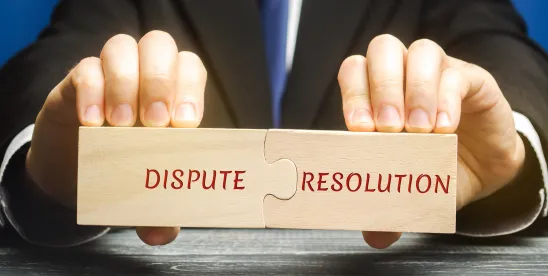The best way to understand the future of dispute prevention and resolution is to “follow the money.” The catchphrase, first popularized in the 1976 film All the President’s Men, about the Watergate scandal that brought down the presidency of Richard Nixon, has come to mean the process of identifying and tracing the movement of funds through various financial transactions and records to uncover corruption or other criminal activities. But the phrase is also applicable in a broader context when considering the relationship between the expansion of global business and the ramifications of legal disputes.
As trade and cross-border commerce grow, businesses must respond quickly to the shifting geopolitical and economic landscape, as we saw during the COVID-19 pandemic. When new market opportunities arise, companies take advantage of the moment whether it involves forming joint ventures, building manufacturing facilities, or establishing supply chains—all of which have led to an increase in legal disputes. More and more, businesses are turning to alternative dispute resolution services to settle such issues rather than utilizing the courts.
By “following the money”—in this case, current deal flow, trade and investment trends, and the evolving needs of businesses worldwide—we can map out what the future of dispute prevention and resolution might look like:
- More Intra-Regional Disputes
Historically, investment flowed west to east (such as Europe into Asia) or from the Global North to the Global South. Now, trade is much more divergent and increasingly intra-regional. China, Singapore, and Japan, for example, are among the top investors in Indonesia. Nearly 60% of Asia’s trade is conducted with regional trade partners, up from 53% in 2000 and will continue to rise. Trade integration in Asia is advancing rapidly, driven by supply-chain shifts and localization.
Trade between African economies increased by 6% in 2023. The establishment of the African Continental Free Trade Area (AfCFTA) has created one of the largest free trade areas in the world—a market of 1.4 billion people and a combined GDP of USD 3.4 trillion—that could significantly transform Africa’s trade and economic landscape.
Closer to home, NAFTA has fundamentally reshaped North American economic relations since it went into effect in 1994, driving unprecedented integration between the developed economies of Canada and the United States and Mexico’s developing one. Last year, Mexico surpassed China to become the leading trade partner of the United States, as its exports to the U.S. rose by 4.6% and China’s plummeted by 20% over the previous year, according to the U.S. Department of Commerce.
We can expect more intra-regional disputes as these trade patterns strengthen. Last year, 45% of newly registered cases at the ICC International Court of Arbitration involved parties from the same region, reflecting the importance of cross-border trade, investment, and commerce among countries within the same geographic area.
- Renewable Energy Transition
The transition from fossil fuels to clean energy is critical to mitigate the impacts of global climate change. This costly and complex pivot to renewable energy technologies also carries a greater risk of disputes. It will involve regulatory changes, new infrastructure, and the decommissioning of fossil fuel-based generating facilities, along with price volatility and security issues. Oil and gas companies, for example, must repurpose assets that have been operating for decades, and wind down drilling, extraction, distribution, and processing infrastructure.
Energy and construction disputes have accounted for more than 40% of new ICC arbitration cases year-on-year for over a decade, and these disputes are likely to increase at a time when countries are racing to meet both national and global carbon-reduction goals.
- Trending Technology
The artificial intelligence revolution is reshaping global economic dynamics, providing investors with unparalleled opportunities to make bets on a technology that is transforming business operations, financial markets, and nearly everything in our lives. Private companies are piling into the space backed by huge investments and a slew of initial public offerings (IPOs): In the first quarter of 2024, technology-related deal volume and value were up significantly over the same period in the prior year, with the total deal value in Q1 2024 higher than any quarter in 2023.
At the same time, non-tech companies are also investing in technology to ensure they have state of the art systems and operations. Joint ventures and other collaborative agreements in this area have become a prominent feature of corporate strategy. The protection and enforcement of technology-related rights —such as intellectual property (IP) rights and rights to exploit and monetize data – are expected to lead to more technology related disputes in non-technology sectors, such as the energy and life sciences sectors.
- Expedited Procedures
Companies are not only turning to dispute prevention and resolution in growing numbers, but they also want the proceedings to move as quickly as possible to reduce the time and costs involved, part of a broader strategy to improve corporate efficiency and predictability.
To accommodate these needs, the ICC Expedited Procedure Provisions has instituted a streamlined arbitration process designed to end with a final award within six months of the case management conference. In addition, the arbitrators’ fees are reduced by 20%. Notably, 80% of the cases under the expedited procedures to date did not have any document exchange, avoiding what is otherwise a very costly stage of any dispute.
Although the expedited procedures apply automatically in cases where the amount in dispute does not exceed USD 3 million, parties are increasingly choosing the expedited options, even with amounts in dispute exceeding USD 100 million, by including an additional line after their ICC arbitration model clause: “The expedited procedures apply regardless of the amount in dispute.” With efficiency and predictability driving business decisions, we can expect more companies to turn to the expedited procedures for even their large disputes.
- Amicable Dispute Resolution
It is a given that the current geopolitical landscape is more complex and volatile than ever before, posing new levels of uncertainty for business leaders. Armed conflicts, climate change, shifting alliances, and market barriers have become all too commonplace, compelling companies to seek a variety of alternative techniques to resolve disputes. These include facilitated negotiation or mediation, or companies may try to prevent these disputes from arising or escalating in the first place. In some instances, mediation or other techniques may lead to an amicable resolution even if an arbitration or litigation has already started. Encouraging and guiding parties on how to avoid the likelihood of a conflict is becoming a significant part of arbitration, and ICC’s Dispute Resolution Services is continually updating and refining its practice guidelines to help parties proactively mitigate, minimize, and manage risk to avoid lengthy and ultimately very costly legal battles.
Despite formidable obstacles, companies involved in national, global, and inter-regional commerce will continue to expand business operations, introduce new products and services, and embrace the technology revolution to remain competitive and profitable. It is also clear that businesses and industries will face new pressures along with disputes as trade and commerce go beyond traditional borders into new jurisdictions, with differing laws, legal structures, and norms. By following the money, we can identify where businesses are going and what they need and offer specialized arbitration and mediation services that are efficient and effective and help companies navigate a complex business environment.




 />i
/>i

